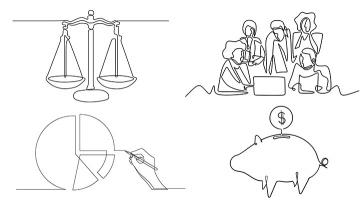A strengthened social institutional framework
Promoting quality in social policies implies consolidating their institutions; that is, aiming at adopting appropriate standards and laws, clear mandates, effective organizational and coordination frameworks, management instruments adapted to the challenges, and sufficient and constant financing. By contributing to the construction of higher quality social policies that reduce poverty, social institutions diminish inequalities, guarantees rights, and ensures access to well-being, thus strengthening social cohesion.
Effective social institutional framework must also adapt to new challenges and demands, adjust their rules, improve their articulation and coordination mechanisms with old and new actors, adapt and perfectionate their management instruments, and optimize the use of resources and/or redirect them to new objectives.
The capacity of social institutions to meet such requirements has been tested during the current COVID-19 crisis, and the length of its impacts will continue to generate new demands and challenges. In this sense, the following questions may encourage the discussion:
- What have been the main coordination challenges with old and new actors?
- What positive elements can be drawn from the actions implemented in response to the crisis?
- What would be the main contributions to the population's well-being and social cohesion?
- What new objectives and adaptations of the implemented actions can be foreseen?
- Among the emergency actions implemented, which will be discontinued or, on the contrary, integrated to the set of social programs?
- Can new priorities be identified in terms of welfare and social cohesion?
We invite you to enter below to participate in our first discussion with the topic "Territorializing RAISD at the local level"

